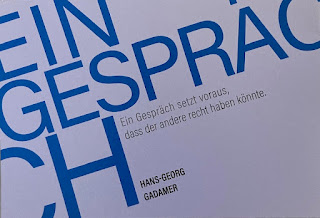The 20th century German philosopher Hans-Georg Gadamer once wrote, "A conversation presupposes that the other person could be right."
We, as a society, seem to have lost this insight in recent years. Most public "conversation" is fiercely adversarial, with each participant focussed only on their own point of view, on putting over their own agenda, with little care for what the other person thinks or believes. Scoring points seems to be more important than learning about the other.
I think that is so sad. I believe that *no-one* has Got It All Right, whatever "It" is, and that there should always be room and time for listening to what the other person says, for learning from each other. Even if our lack of listening skills come from a misplaced zeal for our own points of view, it is still wrong to disregard the wisdom of other people. Like Gadamer says, "the other person could be right".
If I was in charge of the world (😀) I would wave my magic wand and stop all conflict in its tracks. Then I would enforce a long process of deep listening on all participants, interspersed with times of stillness and meditation, because in true conversation, where there is give and take, it is possible to come to understand and appreciate that we are not always right, that the other person has a point, if not several points, with which we might come to agree, if only we thought about it long enough. Which would be where the times of stillness and reflection came in.
We all have the innate ability to pause before we leap in with a reaction, but in order to practice this, we need to step back from our immediate gut responses, and take time out to reflect on what we have heard. To understand that "the other person could be right".
And even if we know for sure that the other person is wrong (for example, if they are saying or doing hateful things to other people or the planet) there are still better ways of responding than through instant aggro. Because mutual aggression only leads to entrenchment behind fixed positions. Whereas, respectful dialogue may just lead towards a change in behaviour, to a more enlightened understanding.
I wonder how much more peaceful, how much more harmonious, our world would be, if more of us tried to put this into practice?


